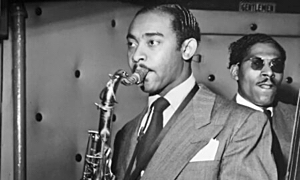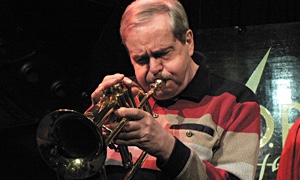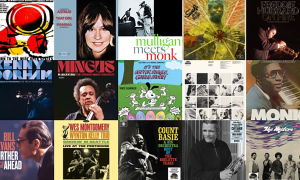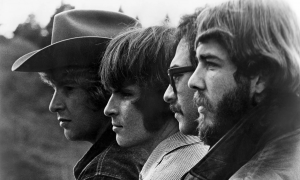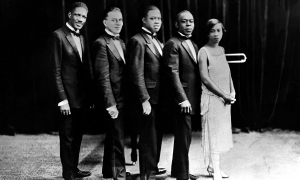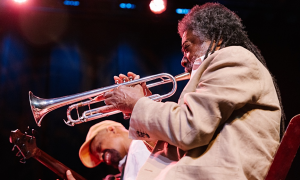Home » Jazz Articles » Book Review » Heartbreaker: A Memoir by Mike Campbell
Heartbreaker: A Memoir by Mike Campbell
 Heartbreaker: A Memoir
Heartbreaker: A Memoir Mike Campbell with Ari Surdoval
464 Pages
ISBN: #978-0306833199
Grand Central Publishing
2025
In what may be the sole expression of explicit ego he ever really displayed during his history with Tom Petty and the Heartbreakers, Mike Campbell has written A Memoir describing his time as guitarist, record producer and regular songwriting partner of the late bandleader for the archetypal American rock and roll band.
The author's greatest accomplishment with his tale may very well be the way he gives exactly the correct attention due each of the topics he covers. Whether or not Campbell intentionally meant to clarify the enigmatic circumstances of his collaborations, the four hundred sixty-four pages do serve the purpose of bringing to light the dynamics of his relationship with Petty as well as both their respective ties to the rest of that enormously popular ensemble.
It was clearly a most unusual respect the bandleader commanded. Members of the group including Campbell contributed to Tom Petty solo records, while the quintet's figurehead was able to reconvene the early ensemble Mudcrutch for recordings and live dates in the 2000s. It is thus little wonder that a pang of envy and regret hits Mike Campbell when he meets Roger Daltrey and Pete Townshend of The Who, then goes on to contemplate their own history in respect to his creative partner.
Campbell's account of his past in that context leaves no doubt about how integral a member of that unit he was. In doing so, however, the guitarist/songwriter refuses to overestimate his role in either his work with Petty and company or the other notables with whom he collaborates so fruitfully, such as Don Henley of the Eagles and Stevie Nicks of Fleetwood Mac.
In fact, offering his self-portrait, Campbell may be humble to a fault. By the same token, however, his deference to others is right in line with the persona that evolved on stage and on record: his guitar work is bereft of flash, and so understated it is not so readily discernible as much greater than the sum of its parts.
Accordingly, in co-authoring Heartbreaker with Ari Surdoval, Mike Campbell provides vivid and specific detail about all the stages of his life, including marriage and subsequent fatherhood. And remarkably, he does it all without overstating the obvious or succumbing to melodrama (even in his last moments with the dying Petty).
Whether it is the main author's own painful shyness as a youth (and as an adult too depending on the company he is keeping) or the abject poverty in which he lived when much younger, his perceptions speak for themselves without undue embellishment. Of course, the arc of Campbell's life seems to bend almost inexorably toward success: why else would his high school guidance counselor take it upon herself to enact the process of his admission to the University of Florida?
Recounting the succession of such beneficent encounters repeatedly strikes the man with absolute incredulity. Mike Campbell is so humble in his stories of realizing dreams he terms his wildest—knowing and playing with The Beatles' George Harrison, for instance—he almost overlooks how integral to the process is his own often urgent sense of purpose in seizing those opportunities.
The concentrated application of Campbell's practical skills is simply a corollary to instincts that became increasingly well-honed by time and circumstance. For instance, he rises above his resentment toward Tom Petty for establishing a creative connection with Electric Light Orchestra's Jeff Lynne's ELO, initially unbeknownst to him. In doing so, Campbell consciously decides to rise above the fleeting negativity and collaborate with them on what turned out to be the late bandleader's enormously successful first solo album Full Moon Fever (MCA, 1989).
Likewise, following a chance collaboration in 1985 at the initial Farm Aid benefit concert, when Bob Dylan calls Mike Campbell to discuss his (Dylan's) options for taking a fully-formed band out on tour with him, the latter immediately volunteers Petty and company. And the wisdom of the decisions proves righteous as both the Nobel Laureate and the Florida-based band flourish over the course of their extended road work.
Mike Campbell relates those insightful scenarios just when Heartbreaker moves to a more vaguely episodic narrative instead of the granular detail the writer has utilized in previous chapters. A notable exception to the more general approach involves the pivotal meeting between the four Heartbreakers, sans Petty, with late co-manager Elliot Roberts.
Alone with the man who had co-founded Asylum Records (with David Geffen) and shepherded Neil Young through a half-century of his career, Campbell assumes the role of a leader, contrary to his comrades' discontent and revolt. In doing so, he persuades them to do exactly what he has done: put aside their egos and pledge allegiance to the bandleader in his role as the figurehead for their shared endeavor(s).
During this more generalized section of writing, significant incidents such as Tom Petty's injury during the stultifying sessions for Southern Accents (MCA, 1985) seems to get short shrift. It is almost as if some (overly?) drastic editing took place roughly three-fourths of the way through the book to maintain a reasonable length. But Campbell's eye for detail returns in short order, not coincidentally in his descriptions of touring with Dylan.
Still, he continues to give the proper weight to his chosen topics. For instance, his summary of Petty and Heartbreakers' quick, efficient recording of Let Me Up (I've Had Enough) (MCA, 1987)—immediately post-Dylan roadwork—is as concise as the way he relates his own health scare from substance abuse. And he only needs to share two anecdotes from the period his mentor was dealing with his own self-professed struggle with heroin to paint a vivid picture of shared pain.
In such passages and the bulk of this tome, Mike Campbell's prose radiates such a casual, off-the-cuff air, he sounds like he is merely musing to himself. So it is little surprise he so often succumbs to guitar geekdom in describing chord progressions and the inherent profundity of the placing of certain notes in a melody. The veteran musician never forgets his roots.
Aside from that aforementioned minor (and thus forgivable) lapse, both the style and substance of the material in A Memoir is unusually captivating. In fact, Mike Campbell's intrinsically self-effacing attitude may be his greatest strength as a writer, just as it was on stage and in the recording studio with his long-time bandmates. Or for that matter, his later collaborations as a recruit to the final lineup of Fleetwood Mac and leading his own band The Dirty Knobs (an enterprise Tom Petty initially dismissed out of hand).
To that end, the photos of Mike Campbell on the dust cover of Heartbreaker capture the evolution of his life experience as evocatively as the sixteen pages of varied images (deliberately?) inserted just prior to the second part of the book. The front cover close-up finds him grizzled and hirsute, but above all bemused, while the live action shot on the back reveals him equally resolute and persistent as he plays guitar.
Given Mike Campbell's assiduous grasp of focus—no doubt encouraged by co-author Surdoval—it is not surprising all those character traits are fundamental to the content he presents in such deceptively unassuming fashion in A Memoir. Those qualities only render his narrative more credible, particularly at those multiple points the author himself scrutinizes events, woven in and out of his personal and professional life, that appear as nothing less than an extended streak of magnificent serendipity.
Tags
Book Review
Mike Campbell
Doug Collette
Sacks and Co.
Grand Central Publishing
Tom Petty and the Heartbreakers
Tom Petty
Roger Daltrey
Pete Townshend
The Who
Don Henley
Eagles
Stevie Nicks
Fleetwood mac
the Beatle
George Harrison
Electric Light Orchestra
Jeff Lynne
Bob Dylan
Neil Young
Comments
PREVIOUS / NEXT
Support All About Jazz
 All About Jazz has been a pillar of jazz since 1995, championing it as an art form and, more importantly, supporting the musicians who make it. Our enduring commitment has made "AAJ" one of the most culturally important websites of its kind, read by hundreds of thousands of fans, musicians and industry figures every month.
All About Jazz has been a pillar of jazz since 1995, championing it as an art form and, more importantly, supporting the musicians who make it. Our enduring commitment has made "AAJ" one of the most culturally important websites of its kind, read by hundreds of thousands of fans, musicians and industry figures every month.










